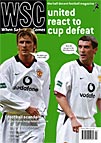 Tom Bower, whose investigations helped bring down Robert Maxwell, turns to football in his latest book, Broken Dreams. It left Harry Pearson screaming …
Tom Bower, whose investigations helped bring down Robert Maxwell, turns to football in his latest book, Broken Dreams. It left Harry Pearson screaming …
A decade or so ago Paul Kimmage, who would later ghost Tony Cascarino’s autobiography, wrote a book about his experiences as a professional cyclist. A Rough Ride told of systematic drug use by riders in races such as the Tour de France. In Britain, where bike racing ranks alongside clay-pigeon shooting, Kimmage was rewarded with the William Hill Sports Book of the Year award. In Europe, where cycling is big news and big business, however, he was denounced by everybody from fellow riders to sports journalists as a fantasist and an embittered loser. The Irishman had predicted this would happen. There existed, he said, a code of silence within the world of cycling when it came to drug taking, extending from the mechanics to the upper echelons of cycling’s ruling bodies, from the team masseurs to all branches of the media.